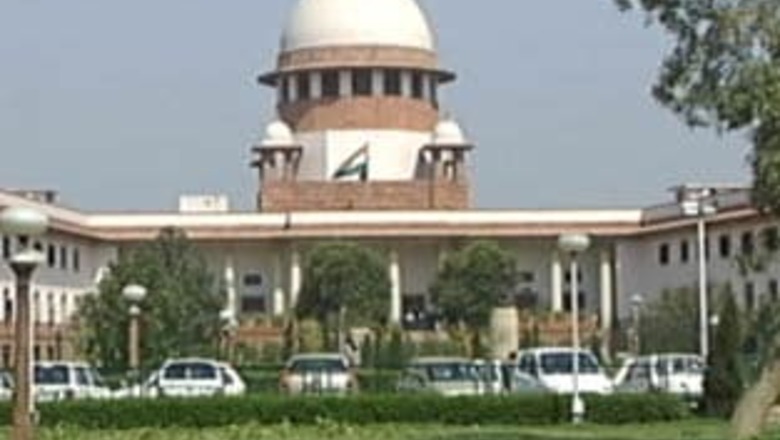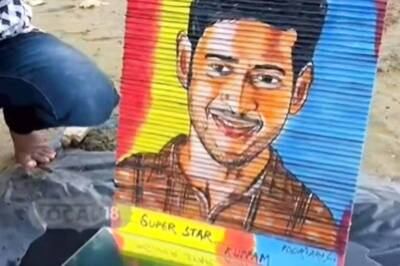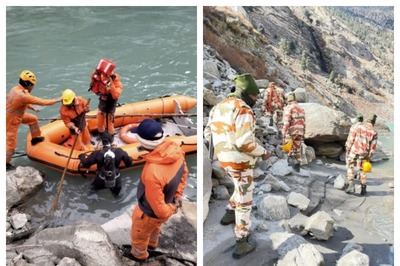
views
New Delhi: The Supreme Court has held that doctors cannot be "unnecessarily harassed" by patients or their claimants to extract compensation for death or disability due to alleged medical negligence.
A bench of Justices Dalveer Bhandari and H S Bedi said it was the bounden duty of the society to ensure that doctors perform their duties without apprehension of malicious prosecution though the interests of the patients should be paramount.
"It is our bounden duty and obligation of the civil society to ensure that the medical professionals are not unnecessarily harassed or humiliated so that they can perform their professional duties without fear and apprehension.
"The medical practitioners at times also have to be saved from such a class of complainants who use criminal process as a tool for pressurizing the medical
professionals/hospitals, particularly private hospitals or clinics, for extracting uncalled for compensation. Such malicious proceedings deserve to be discarded against the medical practitioners," Justices Bhandari writing the judgement said.
The apex court made the remarks while dismissing the Rs 45-lakh compensatiion claim of Kusum Latha, widow of R K Sharma, Senior Operations Manager in Indian Oil Corporation's Marketing Division who, according to the claimants, died due to negligence committed by the doctors of Batra Hospital and Medical Research Centre
Sharma died on October 11, 1990, of 'pyogenic meningitis' after doctors at the hospital performed a surgery to remove an encapsulated malignant tumour in the left adrenal on the abdominal side which involved a complicated procedure.
Kusum Latha moved the National Consumer Disputes Redredssal Commission (NCDRC) with a plea for Rs 45 lakh compensation charging that the death occurred due to medical negligence.
The Commission, after examining various records, dismissed the widow's plea, after which she moved the apex court.
The apex court too, after perusal of the records and hearing the parties, noted that in the present case Kusum Latha could not establish the charge of negligence.
Citing a number of its earlier judgements, the apex court said medical professionals are entitled to protection so long as they perform their duties with reasonable skill and competence and in the interest of patients.
"The interest and welfare of the patients have to be paramount for medical professionals. Doctors in complicated cases have to take a chance even if the rate of survival is low."
The professionals should be held liable for his act or omission but courts, at the same time, have to be extremely careful to ensure that professionals are not unnecessarily
harassed and they are able to carry out their professional duties without fear, the apex court said.
According to the apex court, the normal human tendency is to pick fault whenever there is a death in the family for which the doctor cannot be made a scapegoat.
"It is a matter of common knowledge that after some unfortunate event, there is a marked tendency to look for a human factor to blame for an untoward event, a tendency which is closely linked with the desire to punish. Things have gone wrong and, therefore, somebody must be found to answer for it.
"A professional deserves total protection. The Indian Penal Code has taken care to ensure that people who act in good faith should not be punished. Sections 88, 92 and 370 of the Indian Penal Code give adequate protection to the professional and particularly medical professionals," the bench said.
The apex court said to prosecute a medical professional for negligence under criminal law it must be shown that the accused did something or failed to do something which in the given facts and circumstances no medical professional in his ordinary senses and prudence would have done or failed to do.
However, it clarified that "We should not be understood to have held that doctors can never be prosecuted for medical negligence. As long as the doctors have performed their duties and exercised an ordinary degree of professional skill and competence, they cannot be held guilty of medical negligence."
The court said, "Every surgical operation is attended by risks. We cannot take the benefits without taking risks. Every advancement in technique is also attended by risks.
"But we should be doing a disservice to the community at large if we were to impose liability on hospitals and doctors for everything that happens to go wrong. Doctors would be led to think more of their own safety than of the good of their patients," the bench said.
The apex court said initiative by doctors would be stifled and confidence shaken if cases are slapped against them for perceived negligence.
"A proper sense of proportion requires us to have regard to the conditions in which hospitals and doctors have to work.
We must insist on due care for the patient at every point but we must not condemn as negligence that which is only a misadventure.
"A mere deviation from normal professional practice is not necessarily evidence of negligence.
"A doctor faced with an emergency ordinarily tries his best to redeem the patient out of his suffering. He does not gain anything by acting with negligence or by omitting to do an act. Obviously, therefore, it will be for the complainant to clearly make out a case of negligence before a medical practitioner is charged with or proceeded against criminally," the apex court said.
"A medical practitioner would be liable only where his conduct fell below that of the standards of a reasonably competent practitioner in his field," the court said.
"In the realm of diagnosis and treatment there is scope for genuine difference of opinion and the professional doctor is clearly not negligent merely because his conclusion differs from that of other professional doctor.
"The medical professional is often called upon to adopt a procedure which involves higher element of risk but which he honestly believes as providing greater chances of success for the patient rather than a procedure involving lesser risk but higher chances of failure," the apex court said.
The bench said just because a professional looking to the gravity of illness has taken higher element of risk to redeem the patient out of his/her suffering which did not yield the desired result may not amount to negligence.
"Negligence cannot be attributed to a doctor so long as he performs his duties with reasonable skill and competence.
Merely because the doctor chooses one course of action in preference to the other one available, he would not be liable if the course of action chosen by him was acceptable to the medical profession.
"It would not be conducive to the efficiency of the medical profession if no doctor could administer medicine without a halter round his neck," the bench remarked.




















Comments
0 comment